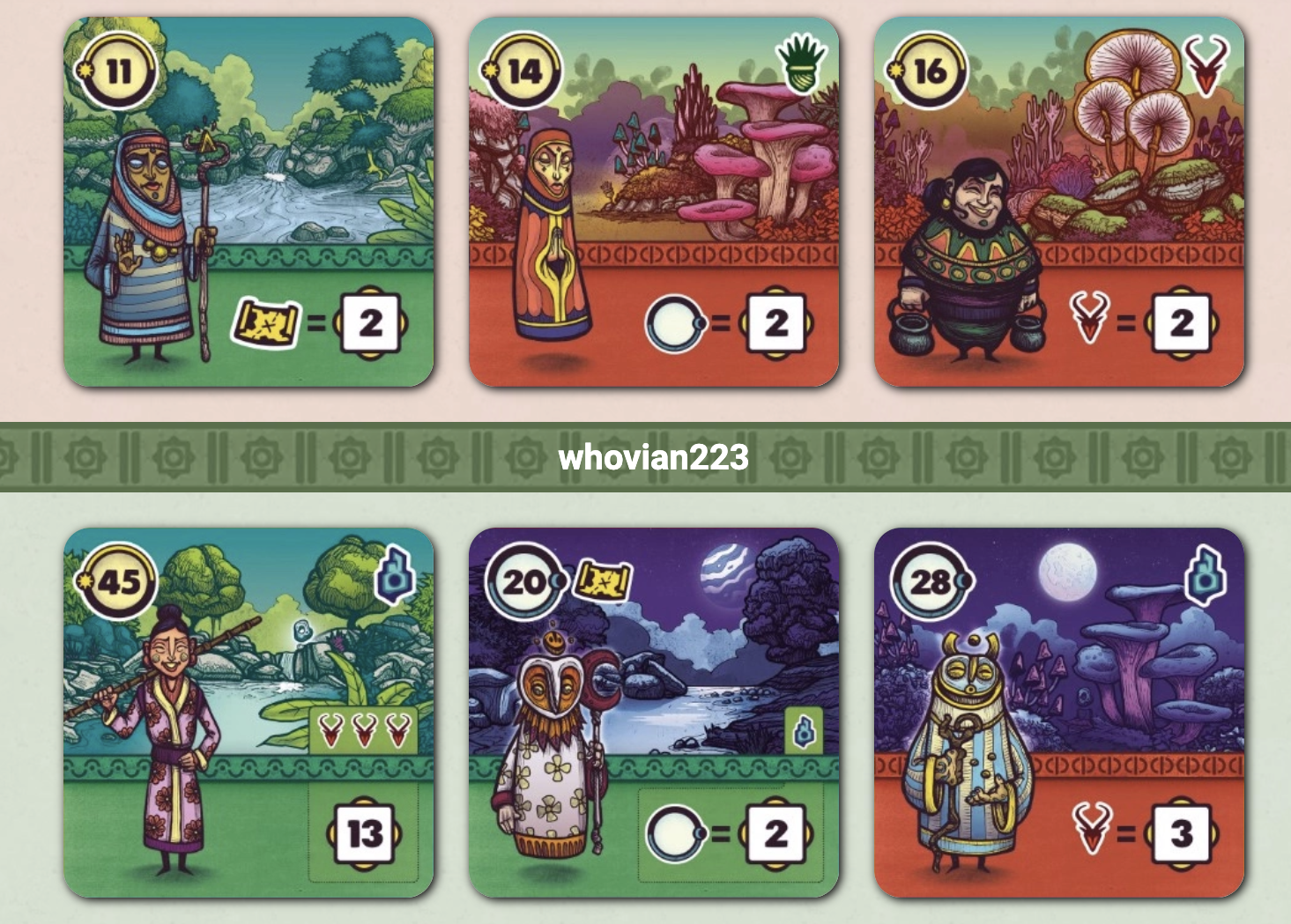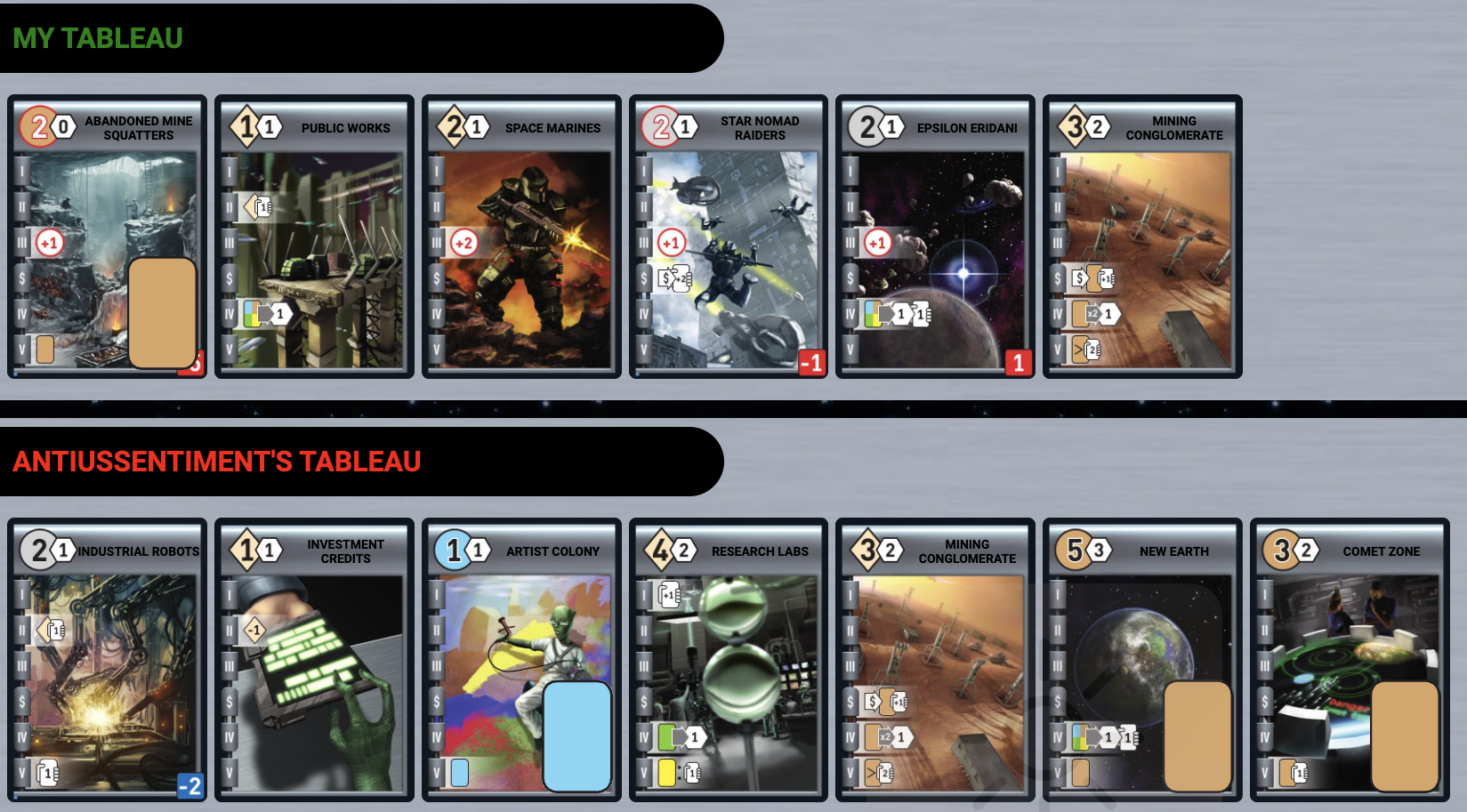Learning Faraway and Race for the Galaxy on Board Game Arena
I’ve always resisted Board Game Arena the same way I resisted drop-in play at a game shop: If you’re not at a table with good friends, holding the damn pieces, what’s the point? Second-order experiences will not sustain.
But my transition to being mostly a solo player has been surprising and joyful, so why not challenge my absolutes again?
BGA has given me a chance to bond remotely with a new online pal from Canada — Dave from Dude! Take Your Turn — and a friend of the show for a few years now: Noisy Andrew of Party Meeple, hailing from Western Australia.
I buck against the experience at first. Not being in the haptic envelope is simply jarring, and my trial free account triggers a lot of upsell points for things I want to do, like invite either of my pals to a game.
I am completely unengaged for the first few turns of each match, but because Board Game Arena game apps know the rules and forces me into plays that are legal, if not optimal, the structures starts to gel as I play asynchronous games of Faraway with Dave and Race for the Galaxy with Andrew.
Faraway on Board Game Arena: On top, my first three visits are focused on modest prizes, but maxing the benefit of sequential locations. On the bottom, Dave doing something that will probably beat me.
Faraway With Dave
Dave offers to show me the ropes via this recent hit, a card drafter and tableau builder with two piquant extras going for it:
• Your scoring path is presented as a journey in a vividly imagined land with illustrated locals who greet you on each leg of the journey. They’re rendered with touches of the familiar spritzed with the fantastic. The theme seasons the moments of gear-grinding when you’re trying to puzzle out which cards to place on your journey and when. It’s always successfully atmospheric because its graphic choices are clever: Deserts are blue. Your hostel hosts wear elements of traditional garb lifted from across cultures and centuries, paired with imagined touches. Some of them look like maniac shamans, some your next best pal, some saturnine or standoffish…this place has flavor that always suffuses the calculus of the scoring puzzle.
• This “meet the locals” scheme also informs the puzzle aspect closely: These strangers are going to hook you up with a meal or a place to crash on your way through, but they’re going to want sought-after regional gifties on your way back if you want to score any points. This puts you in a turn-by-turn kaleidoscope of options — trying to build regional color runs vs. time-of-visit bonuses vs. rare plants, rocks or animals — that’s yoked to a very tight timeline through which you must think backwards and forwards. Once I get my first few drubbings out of the way, I’m hooked. And ready for my second series of drubbings.
In addition to being a welcoming docent in the shifting and deeply personal galleries of a passionate hobby player, Dave is a prodigious player. I enjoy peeking onto the his table to gauge “hotness” lists against what actual human beings are doing and documenting. I have a collection of creators like Dave on my RSS reader because of their enthusiasm, authenticity, and sheer amount of games they cover. This is especially valuable considering my glacial, neurotic and solipsistic play style.
In our current game I’m trying a strategy where I focus on the kicker Sanctuary cards you get for sequencing the regions you visit in ascending numerical order.
The automated oddsmakers of Board Game Arena give me a 27% chance of succeeding.
Race for the Galaxy on Board Game Arena: Andrew builds a vibrant economy while I mortgage everything to buy guns and seize production worlds that I don’t know how to run. U-S-A! U-S-A!
Race for the Galaxy with Noisy Andrew
Small board game designer Noisy Andrew and I go a different way: He proposes Race for the Galaxy — a game I tried once a long time ago while badly hung over. I neither grasped nor enjoyed it.
But I did notice its sticking power. In the years years since Rio Grande Games released RftG, despite hundreds of intervening iterations, twists and improvements on tableau building and set collection, it’s still mentioned fondly and bobs up in the occasional “best of” retrospectives. Andrew is only popping back onto BGA because I asked, so I run with his pick. I don’t want to miss out a second time.
I am taken immediately by the flavor of empire- and galaxy-building in the variety and names of the cards. I am also taken to the woodshed. I focused on stacking military muscle as a beginning action framework — pick a direction and row even if it’s not the right one, that’s what Dennis Hopper’s Deacon taught us in Waterworld. The unique “pick a phase where your stuff activates” and the “why” of cards otherwise evades me totally. Andrew thrashes me.
Smashing into the game’s guardrails repeatedly, I start to gain a sense of how to put together combos by my second game. As I write this, I’m doing quite well down the home stretch by shoveling alien tech and novelty goods into a consumer world apparently populated by people with lots of discretionary cash and little discernment. Unlike the U.S., which now has neither. I think we should import Dave and Andrew. That’s my economic plan. I expect your vote.
As I become competent with the BGA interface and the strategy of each game, I also become impatient with asynchronous play. I like these games. I’m getting that thrilling first step change in understanding where basic mechanics are connecting to better decisions. I want to play harder. To be fair to Andrew, he did tell me he was a “move a day” kind of guy, but when he hit two days in between moves, I recorded a plaintive Australian song to remind him to take his turn:
Thanks for being a sport, Noisy. You’re a good sort.
On to Squad Leader and Vijayanagara: The Deccan Empires of Medieval India, 1290-1398?
These gents might help me fill another shortcoming in my current tabletop career: Multiplayer stuff that’s more crunchy and involved than what we’re getting on the table during Monday night play at Frontier Geeks down on Main St. in Trinidad.
Once in a while I’ll lift up the silver lid on my wargame tray for local pals, seeing if they like the scent of old paper, reference tables, the promise of sweeping combat, the dense and spiky broth of highs and lows they’ll feel during this kind of story. No takers.
I complained about this to both Dave and Andrew. Dave shows me Rally the Troops, a small-collection, rules-enforced historical wargame platform where he has been fumbling his way through Vijayanagra, a game on my watch list. I’ve been wanting to get into a COIN/ICS title so bad this year. This might be the best way.
Andrew offers to help me with another late-in-life wish in that category: I got Squad Leader for Christmas in 1979 and never played it. I want to return to it and play it before I die. It feels like an important current of my life that petered off into a bog somewhere. Fortunately for me, he knows the game, confides that two-player wargame opponents are one of his shortages, and not long after he starts sending me screen caps of his Vassal downloads and Squad Leader tutorials. Holy shit. We are going in.
Board Game Arena — with the help of a couple buddies — is delivering new surprises all the time. I avoided platforms like BGS for years. Now it looks like I’ll be playing on three. Game on.



